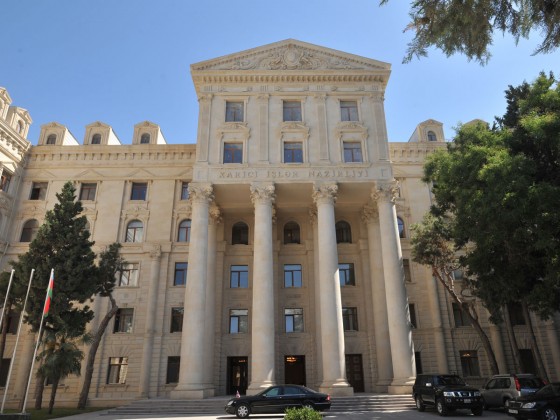
Azerbaijan’s Foreign Ministry strongly condemns organization of a concert program of a provocative nature, which is scheduled to be held Sept. 2 in Azerbaijan’s occupied territory – the city of Khankendi, with participation of Russian opera singer Lyubov Kazarnovskaya and other persons, the head of the ministry’s press service, Hikmet Hajiyev told Trend August 31.
Hajiyev said this concert program serves the promotion of the separatist regime, created as a result of the aggression, occupation and ethnic cleansing policy of Armenia against Azerbaijan.
Hajiyev also reminded Kazarnovskaya, who talks of justice and peace, that Armenia and the separatist regime committed genocide in 1992 against Azerbaijani population in Khojaly, a town located a few kilometers away from Khankendi, where the said concert is to be held.
“Those calling themselves culture figures should be ashamed, at least by the young children and women who became victims of this tragedy,” he said, adding, “The result of Armenia’s vandalism policy is the destruction and elimination of rich material and cultural values of the Azerbaijani people in Azerbaijan’s occupied territories, including Karabakh’s musical heritage, known throughout the world.”
“The names of foreign nationals who are to take part in the concert program, will be included in the Foreign Ministry’s list of undesirable persons after an appropriate investigation,” Hajiyev further said.
On February 25-26, 1992, the Armenian armed forces, together with the 366th infantry regiment of Soviet troops stationed in Khankendi, committed an act of genocide against the population of the Azerbaijani town of Khojaly.
As a result of the massacre, 613 people were killed, including 63 children, 106 women and 70 old people. Eight families were totally exterminated, 130 children lost one parent and 25 children lost both. A total of 487 civilians became disabled as a result of the onslaught. Some 1,275 innocent residents were taken hostage, while the fate of 150 people remains unknown.
The conflict between the two South Caucasus countries began in 1988 when Armenia made territorial claims against Azerbaijan. As a result of the ensuing war, in 1992 Armenian armed forces occupied 20 percent of Azerbaijan, including the Nagorno-Karabakh region and seven surrounding districts.
The two countries signed a ceasefire agreement in 1994. The co-chairs of the OSCE Minsk Group, Russia, France and the US are currently holding peace negotiations. Armenia has not yet implemented the UN Security Council’s four resolutions on the liberation of the Nagorno-Karabakh and the surrounding regions.
Edited by CN
—
Follow the author on Twitter: @Asebaa
Trend
